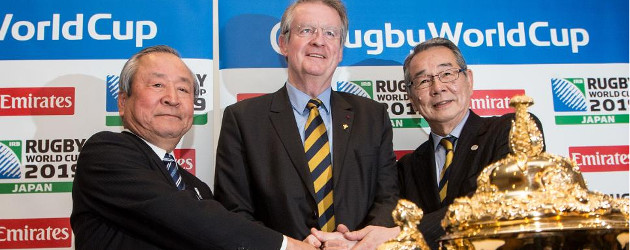Host cities and venues announced for Rugby World Cup 2019 in Japan
A total of 12 venues will host matches
Geographical spread across the length and breadth of the country
Tournament legacy plans designed to grow the game in Japan and throughout Asia
Excitement building ahead of first Rugby World Cup to be held in Asia
The 12 cities that will host matches at Rugby World Cup 2019 in Japan were revealed at simultaneous announcements in Dublin and Tokyo on Monday.
The venues are located across the length and breadth of Japan, giving the sports-loving population every opportunity to be a part of rugby’s showcase tournament. From Sapporo City in the northernmost main island of Hokkaido right down to Kumamoto City in the south, there is a genuine geographical spread of venues, meaning fans will be at the very heart of the event, and there is also a healthy mix of stadium capacities ranging from 80,000 in Tokyo to 15,000 at Kamaishi City in Iwate Prefecture.
The full list of venues is:
Sapporo Dome, Sapporo City
Kamaishi Recovery Memorial Stadium, Iwate Prefecture/Kamaishi City
Kumagaya Rugby Ground, Saitama Prefecture/Kumagaya City
New National Stadium Japan, Tokyo
International Stadium Yokohama, Kanagawa Prefecture/Yokohama City
Ogasayama Sports Park Ecopa Stadium, Shizuoka Prefecture
Toyota Stadium, Aichi Prefecture/Toyota City
Hanazono Rugby Stadium, Osaka Prefecture/Higashi Osaka City
Kobe City Misaki Park Stadium, Kobe City
Hakatanomori Football Stadium, Fukuoka City
Kumamoto Prefectural Athletic Stadium, Kumamoto Prefecture/Kumamoto City
Oita Stadium, Oita Prefecture
Speaking at a media conference in Dublin, Rugby World Cup Limited Chairman Bernard Lapasset said: “This is an important milestone for the tournament. Now we know exactly where the matches will be staged in Japan and, more importantly, the people of those cities and fans around the world can start planning for the big event.
“In 2019, hundreds of thousands of rugby fans will descend on Japan and millions more will watch on television as the world’s best players compete for the right to lift the Webb Ellis Cup. It will be a wonderful tournament and, as it’s the first time Rugby World Cup will take place in Asia, it will be an important milestone for us as we continue to make good on our commitment to grow the global game.”
Rugby World Cup Limited Managing Director Brett Gosper said: “Throughout the venue selection process we have been very impressed with the level of engagement by the cities and prefectures in Japan. They all have shown a remarkable level of commitment and enthusiasm to be a part of staging Rugby World Cup 2019. I would like to congratulate the successful cities but also thank each and every one of the applicants and also Japan Rugby 2019 who have led on this process.”
Japan Rugby 2019 Chief Executive Akira Shimazu said: “I extend my deepest appreciation to all of the 15 candidates and their local governments for participating in the host application process. Each of the candidate cities had excellent credentials to host. Of course, we would like to have had all of the candidates as hosts but we made our selections with the RWCL Board and their deep knowledge of tournament operation needs. Rather than any particular individual candidate rating, we decided on the final selection based the overall needs of the tournament.
“Rugby World Cup 2019 is an event for which the entire nation of Japan, all its people, will be staging and rallying support. And we ask all in the host candidate cities, whether in the final selection or not, to join us in the spirit of ‘all for Japan’ to continue to help prepare for the tournament.”
While making the decision on which venues would be selected, a range of criteria were considered, including stadium quality, nearby training and other facilities, transport and the availability of local accommodation for teams, fans and media. It was also important to choose a diverse range of venues in terms of stadium capacity, geographical spread, rugby development and to ensure a world-class fan experience befitting a tournament of this scale and global importance.
With Rugby World Cup attracting hundreds of thousands of visiting international fans and delivering a six-week global tourism and trade shop-window, the host cities will benefit from a significant economic boost, which for England 2015 is set to deliver a £2 billion injection into the economy.
The media announcement was beamed live to another press conference in Tokyo and a number of other celebrations will take place around the country to mark the successful bids to host matches.
Editors’ notes:
Photos of each venue are available by contacting below.
About Japan Rugby 2019: Japan Rugby 2019 was established as the tournament organiser for Rugby World Cup 2019. The board of JR 2019 is made up of leading figures from the sports, business and government sectors of Japan and it is steering the delivery of the tournament ensuring that all operational and legacy goals are delivered in line with the event strategic and master plan. Rugby World Cup 2019 will break new ground as it will be the first time that rugby’s showcase event has been staged in Asia.
About Rugby World Cup: Rugby World Cup is the financial engine behind unprecedented investment and growth in Rugby worldwide. The net Rugby World Cup surplus from the commercial success of France 2007 and New Zealand 2011 has enabled World Rugby to invest more than £150 million in the game between 2009 and 2012 and commit an anticipated injection of more than £180 million between 2013 and 2016 to underwrite a large range of major funding initiatives including annual national union grants and strategic investments focusing on growing participation and increasing competition across all 120 national member unions affiliated to World Rugby.
Host Cities
Sapporo City
Venue – Sapporo Dome, capacity 41,410
Sapporo has played host to such international sports events as the 1972 Winter Olympic Games and the FIFA World Cup 2002, as well as being the home city to professional baseball and soccer teams. This history of hosting many major sports events is a strong platform for Rugby World Cup 2019 to showcase the special appeal of rugby to an even broader audience in Japan and overseas at the northernmost venue.
Iwate Prefecture and Kamaishi City
Venue – Kamaishi Recovery Memorial Stadium, capacity 16,187
Kamaishi has long been known for steelmaking, being the site of Japan’s oldest steelworks. This also is the city’s connection to rugby, as the factory-sponsored team grew to become one of the top amateur teams in Japan. Although Kamaishi was devastated by the great earthquake of 11 March, 2011, the city has made great strides in its recovery. The city and its residents look to host Rugby World Cup 2019 as a way to thank all those who helped in this recovery effort, in Japan and around the world.
Saitama Prefecture and Kumagaya City
Venue – Kumagaya Rugby Ground, capacity 24,000
Kumagaya is a suburb outside Tokyo known for its many historical and cultural attractions. The city has also promoted sports locally, with rugby receiving particular recognition – Kumagaya is even called Japanese rugby’s ‘hallowed ground of the east’ and is host to the spring all-Japan high school rugby championship. This long-standing, strong local popularity and support of rugby across all ages makes it a fitting host for Rugby World Cup 2019.
Tokyo
Venue – New National Stadium Japan, capacity 80,000
Since the 1964 Olympic Games, the nation’s capital has played host to many international sporting events. Sports are a vital part of the lifestyle of the city’s 13 million residents, who partake as players, fans and event supporters. As Tokyo and its citizens gear up for its second hosting of the Olympic Games in 2020, Rugby World Cup 2019 will be a key element of their sports lifestyle. Rugby fans around the world can expect fixtures at this venue, including the opening and final matches, to be staged as only Tokyo can, commensurate with its scale as a global metropolis and cultural centre.
Kanagawa Prefecture and Yokohama City
Venue – International Stadium Yokohama, Capacity 72,327
Yokohama’s long international connections go back to when its port was opened to the United States, the Netherlands, Russia, England and France in 1859. Beginning with these countries, the international influences shaping Yokohama’s culture have created a truly unique and enjoyable city. It was the link to England that resulted in the origin of rugby in Japan. British soldiers stationed in Yokohama began playing rugby for amusement, leading to the founding of the Yokohama Football Club in 1866. A match took place here in 1873 between garrisons, England versus a Scotland-Ireland combined team. Yokohama’s international sports events since have grown in scale and sophistication, including the final of the FIFA World Cup 2002. Yokohama is confident that it will present Rugby World Cup 2019 with a fitting stage for many passionate fans.
Shizuoka Prefecture
Venue – Ogasayama Sports Park Ecopa Stadium, capacity 50,889
As a tourist destination, Shizuoka is known for its scenery (it is one of the two prefectures straddled by the iconic Mount Fuji), tea orchards and hot springs resorts. For Japanese sports fans, Shizuoka is known for producing star athletes in such sports as soccer, tennis, baseball, basketball and rugby. The Shizuoka Rugby Club was founded in 1929 and is active to this day, joined by four other rugby clubs (including one for players age 40 and older). The Japan Rugby Top League is also popular here, and tag rugby is on the curriculum for many elementary school students in the prefecture.
Aichi Prefecture and Toyota City
Venue – Toyota Stadium, Capacity 45,000
Not surprisingly, Toyota is called the “City of Automobiles” stemming from one of the world’s top car manufacturers having its headquarters here. Located at the geographic centre of Japan, Aichi Prefecture and Toyota can also lay fair claim to being the centre of Japanese rugby. The club team affiliated with that automaker has won a number of national championships over the years and enjoys wide popularity. The venue, designed exclusively for field ball sports, is the largest of its type in Japan and has hosted professional soccer league games and matches at the FIFA World Cup 2002. In rugby, the venue is a stage for some Top League and international matches. Local residents and officials are experienced in supporting large international sports events, and will be a great asset in staging a successful Rugby World Cup 2019.
Osaka Prefecture and Higashi Osaka City
Venue – Hanazono Rugby Stadium, capacity 30,000
The third-largest city in the Osaka region, Higashi Osaka is home to many smaller manufacturing companies with highly skilled craftsmen and artisans, to the extent that it is dubbed the ‘Craftwork City’. Another thing Higashi Osaka is renowned for is rugby. Its venue, Hanazono, is the site for the winter all-Japan high school championship. Hanazono in fact was the first stadium in Japan to be built especially for rugby, in 1929. The venue and the many historic matches and fan support have led Higashi Osaka to be called ‘Rugby City’.
Kobe City
Venue – Kobe City Misaki Park Stadium, capacity 30,312
With mountains on one side and the sea on the other, Kobe is a favorite of foreign visitors and residents alike. No stranger to major international sports events, Kobe has hosted such diverse events as the 1985 Summer Universiade to the FIFA World Cup 2002. The city looks to Rugby World Cup 2019 as its latest opportunity to deliver a top-class tournament to a global audience. Furthermore, this is also a way to tell the world about Kobe’s full recovery after a disastrous earthquake, and to bring its residents closer with rugby and its traditions as the common theme. Rugby already has a solid base in Kobe and it is home to one of Japan’s most venerated clubs.
Fukuoka City
Venue – Hakatanomori Football Stadium, capacity 22,563
Widely known as a gourmet paradise, Fukuoka boasts a wide variety of local specialties. A Fukuoka specialty in a different area is rugby, with the city being the centre of the sport for Japan’s southernmost main island, Kyushu. Rugby in Kyushu got its start when a group of alumni from Keio University in Tokyo working for the same electric utility were transferred to Fukuoka. The team they formed, the Kyushu Rugby Club, led to the wide popularity of the sport. As an indication of rugby’s popularity in Fukuoka, the city actually leads the nation with a proportionately higher number of registered players, compared to cities with much larger populations
Oita Prefecture
Venue – Oita Stadium, capacity 40,000
Oita and its venue are no strangers to major international sports events, having hosted matches for FIFA World Cup 2002 and creating an internationally covered human interest story featuring the Cameroon national team and the village that hosted their camp. The strong bonds that developed between the village and Cameroon expanded to include the entire prefecture. Oita’s rugby players are recognised for their accomplishments from their youth at the all-Japan high school rugby championship and later at the industrial league level. The prefecture welcomes many overseas visitors with its numerous famous hot springs resorts and other sights; it looks to feature Rugby World Cup 2019 as its latest attraction to the world.
Kumamoto Prefecture and Kumamoto City
Venue – Kumamoto Prefectural Athletic Stadium, capacity 32,000
Kumamoto is home to some of Japan’s most exquisite scenery and national parks. In addition to natural beauty, Kumamoto has such renowned man-made attractions as the 400-year-old Kumamoto Castle, one of the largest in Japan. In the Japan rugby community, several top players have come from Kumamoto. Rugby World Cup 2019 represents a special chance for the Kumamoto rugby community to encourage greater participation and further expand the popularity of the sport throughout the prefecture.




